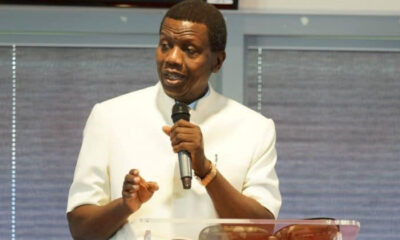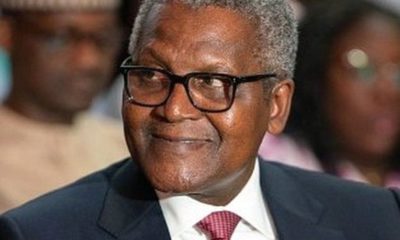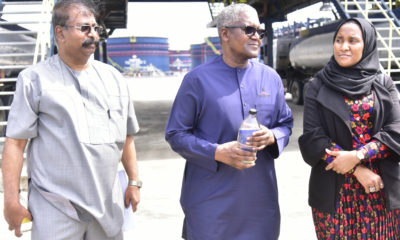Energy
Economic Conspiracy: Dangote Accuses IOCs Of Plotting Against Nigerian Refinery

. . . Laments As Regulator (NMDPRA) Continues To Grant Licences For Importation Of Banned Dirty Diesel, Jet Fuel
There appears to be a strategy of economic conspiracy against Nigeria and Africa being manifest in the oil industry with the International Oil Companies (IOCs) through concerted efforts to frustrate oil refineries in the domestic economy.
Vice President, Oil and Gas at Dangote Industries Limited (DIL), Devakumar Edwin, levelled the accusation, at a one-day training programme for Energy Editors in Lagos.
He maintained that the IOCs in Nigeria were doing everything to frustrate the survival of Dangote Oil Refinery and Petrochemicals.
According to Edwin, the IOCs are deliberately and willfully frustrating the refinery’s efforts to buy local crude by jerking up high premium price above the market price, thereby forcing it to import crude from countries as far as United States, with its attendant high costs.
In addition, Edwin lamented the activity of the Nigerian Midstream and Downstream Petroleum Regulatory Authority (NMDPRA), in granting licences, indiscriminately to marketers to import dirty refined products into the country.
He said, “the Federal Government issued 25 licences to build refinery and we are the only one that delivered on promise. In effect, we deserve every support from the Government. It is good to note that from the start of production, more than 3.5 billion litres, which represents 90 percent of our production, have been exported. We are calling on the Federal Government and regulators to give us the necessary support in order to create jobs and prosperity for the nation.”
According to him, “While the Nigerian Upstream Petroleum Regulatory Commission (NUPRC) are trying their best to allocate the crude for us, the IOCs are deliberately and willfully frustrating our efforts to buy the local crude. It would be recalled that the NUPRC, recently met with crude oil producers as well as refineries owners in Nigeria, in a bid to ensure full adherence to Domestic Crude Oil Supply Obligations (DCSO), as enunciated under section 109(2) of the Petroleum Industry Act (PIA).
“It seems that the IOCs’ objective is to ensure that our Petroleum Refinery fails. It is either they are deliberately asking for ridiculous/humongous premium or, they simply state that crude is not available. At some point, we paid $6 over and above the market price. This has forced us to reduce our output as well as import crude from countries as far as the US, increasing our cost of production…
“It appears that the objective of the IOCs is to ensure that Nigeria remains a country which exports Crude Oil and imports refined Petroleum Products. They (IOCs) are keen on exporting the raw materials to their home countries, creating employment and wealth for their countries, adding to their GDP, and dumping the expensive refined products into Nigeria – thus making us to be dependent on imported products. It is the same strategy the multinationals have been adopting in every commodity, making Nigeria and Sub-Saharan Africa to be facing unemployment and poverty, while they create wealth for themselves at our expense. This is exploitation – pure and simple. Unfortunately, the country is also playing into their hands by continuing to issue import licences, at the expense of our economy and at the cost of the health of the Nigerians who are exposed to carcinogenic products.
“In spite of the fact that we are producing and bringing out diesel into the market, complying with ECOWAS regulations and standards, licences are being issued, in large quantities, to traders who are buying the extremely high sulphur diesel from Russia and dumping it in the Nigerian Market. Since the US, EU and UK imposed a Price Cap Scheme from 5th February, 2023 on Russian Petroleum Products, a large number of vessels are waiting near Togo with Russian ultra-high sulphur diesel and, they are being purchased and dumped into the Nigerian Market.
“In fact, some of the European countries were so alarmed about the carcinogenic effect of the extra high sulphur diesel being dumped into the Nigerian Market that countries like Belgium and the Netherlands imposed a ban on such fuel being exported from its country, into West Africa, recently. It is sad that the country is giving import licences for such dirty diesel to be imported into Nigeria, when we have more than adequate petroleum refining capacity locally…”
Recall that in May, Belgium and Netherland adopted new quality standards to halt the export of cheap, low-quality fuels to West Africa, harmonising its standards with those of the European Union. These measures synchronise fuel export standards with the European domestic market, specifically targeting diesel and petrol with high sulphur and chemical content. Historically, these fuels, with sulphur content reaching up to 10,000 ppm, were exported at reduced rates to countries like Nigeria and other West African consumers.
Belgium’s Minister of Environment, Zakia Khattabi, announced that his country followed the Netherland, which in April 2023 also prohibited the export of low-quality petrol and diesel to West Africa via the ports of Amsterdam and Rotterdam.
Khattabi emphasised that the Netherlands’ decision to restrict dirty fuel exports had redirected the trade to Belgium, now used by oil producers and traders to export gasoline with excessively high levels of benzene and sulphur.
“For far too long, toxic fuels have been departing from Belgium to destinations including Africa. They cause extremely poor air quality in countries such as Ghana, Nigeria, and Cameroon and are even carcinogenic,” said Khattabi.
In September 2017, an investigation by an international organisation, Public Eye revealed that polluted and toxic fuels were being exported on a large scale from the ports of Rotterdam and Amsterdam for export to African markets.
As much as a quarter of the petrol and diesel available in West Africa originates from the ports of Amsterdam, Rotterdam, and Antwerp. These fuels contain sulphur and other pollutants, such as cancer-causing benzene, in quantities up to 400 times the limits permitted in Europe.
The Netherlands and Belgium were enjoined to enforce regulations to shield millions of Africans from exposure to toxic fuels.
The decision of the NMDPRA in granting licenses indiscriminately for the importation of dirty diesel and aviation fuel has made the Dangote refinery to expand into foreign markets.
The refinery has recently exported diesel and aviation fuel to Europe and other parts of the world. The same industry players fought us for crashing the price of diesel and aviation fuel, but our aim, as I have said earlier, is to grow our economy.
He noted that because the refinery meets the international standard as well as comply with stringent guidelines and regulations to protect the local environment, it has been able to export its products to Europe and other parts of the world.
While appealing to the Federal Government and the National Assembly to urgently intervene for speedy implementation of the PIA and to ensure the interest of Nigeria and Nigerians are protected.
He said, “Recently, the government of Ghana, through legislation has banned the importation of highly contaminated diesel and PMS into their county. It is regrettable that, in Nigeria, import licences are granted despite knowing that we have the capacity to produce nearly double the amount of products needed in Nigeria and even export the surplus.
“Since January 2021, ECOWAS regulations have prohibited the import of highly contaminated diesel into the region.”
Energy
Nigeria’s Gas Output Increases By 2.9%, Reaching 2.29 MSCF

Amid a slight increase in gas production, Nigeria’s oil output experienced a substantial rise in November 2024.
Gas production saw a 2.9% month-on-month (MoM) increase, reaching 2,292,951 million standard cubic feet (MSCF) from 2,292,471 MSCF in October.
However, on a year-on-year (YoY) basis, the growth was minimal, with a mere 0.02% increase in output for the first 11 months of 2024, compared to the same period in 2023.
READ MORE: Tinubu Mourns Ex-U.S. President Jimmy Carter, Celebrates His Legacy
The latest gas report from the Nigerian Upstream Petroleum Regulatory Commission (NUPRC) also revealed a 1.6% increase in domestic gas consumption.
A total of 606,658 MSCF was consumed locally, compared to 596,861 MSCF during the same period in 2023. Gas exports, meanwhile, rose by 6.9%, reaching 829,156 MSCF, up from 775,547 MSCF in the corresponding period of 2023.
This growth in exports continues to play a vital role in bolstering Nigeria’s foreign exchange earnings.
Despite these positive figures, sources close to the Ministry of Petroleum Resources (Gas) noted that oil remains the dominant force in Nigeria’s energy sector, with gas taking a secondary role.
On the other hand, the NUPRC’s oil production report revealed a remarkable surge.
Nigeria’s oil output, including condensates, rose by 13.3% year-on-year in November 2024, reaching 1.7 million barrels per day (bpd), up from 1.5 million bpd in November 2023. Month-on-month, oil production also increased by 10%, from 1.5 million bpd in October 2024.
Dr. Muda Yusuf, CEO of the Centre for the Promotion of Private Enterprises (CPPE), discussed the broader structural dynamics within Nigeria’s economy, highlighting the dominance of the non-oil sector.
In his 2025 Outlook, Dr. Yusuf noted that the non-oil sector contributed 94.43% to Nigeria’s GDP in Q3 2024, while the oil sector accounted for just 5.57%.
“However, the economy is characterized by a paradox of the oil sector contributing an estimated 90% of foreign exchange earnings, while the non-oil sector accounts for about 10%,” Dr. Yusuf said.
“This is a structural shortcoming in our economy which needs to be addressed, as sectors that contribute hugely to GDP have no corresponding contribution to foreign exchange earnings.”
He further emphasized the need to address the challenges faced by the non-oil sector, which include issues related to productivity, infrastructure, funding, and regulatory constraints.
“The policy implication is that more should be done to fix the challenges of productivity and competitiveness of the non-oil sector of the economy,” Dr. Yusuf added
Energy
JUST IN: NNPC Ltd Reopens Warri Refinery

The Nigerian National Petroleum Company Limited (NNPC Ltd) has announced that the 125,000-barrel-per-day Warri Refining & Petrochemicals Company (WRPC) in Warri, Delta State, has become operational.
This is coming about a month after the commencement of operations at the 60,000-barrel-per-day-old Port Harcourt Refinery.
The Group Chief Executive Officer, NNPC Ltd, Mele Kyari, made the disclosure during a tour of the facility on Monday.
ALSO READ: SERAP Urges Tinubu To Direct CCB To Publish President’s, VP’s, Others Assets
A video posted by Channels TV on Monday showed Kyari addressing a tour team, which included the Chief Executive Officer of the Nigerian Midstream and Downstream Petroleum Regulatory Authority (NMDPRA), Farouk Ahmed.
Before the tour commenced, Kyari explained that the inspection aimed to show Nigerians the level of work completed so far.
According to him, although the repairs on the facility are not yet 100 per cent complete, operations have commenced.
He said, “We are taking you through our plant. This plant is running. Although it is not 100 per cent complete, we are still in the process. Many people think these things are not real. They think real things are not possible in this country. We want you to see that this is real.”
Located in Ekpan, Uwvie, and Ubeji, Warri, the petrochemical plant produces 13,000 metric tonnes per annum (MTA) of polypropylene and 18,000 MTA of carbon black.
Commissioned in 1978 and managed by NNPC Ltd, the WRPC was built to supply markets in the southern and southwestern regions of Nigeria.
The mechanical completion of the facility was initially scheduled for the first quarter of 2024, according to the Spokesperson of the NNPC Ltd, Olufemi Soneye.
“Warri should be done by Q1 (first quarter) 2024,” Soneye stated.
The WRPC is one of Nigeria’s four refineries. Others include the old and new Port Harcourt Refining Company in Rivers State and the Kaduna Refining and Petrochemical Company in Kaduna State.
Energy
Dangote Partnership: MRS Urges Nigerians To Insist On N935/Litre Petrol Price Nationwide

MRS Oil Nigeria Plc, a prominent player in the Nigerian downstream oil industry, has implemented a new petrol price of N935 per litre across all its retail service stations nationwide.
The company has also called on Nigerians to monitor and report any outlets that fail to adhere to the new price structure.
Biztellers reports that this is consequent upon an announcement by the President of Dangote Industries Limited, Aliko Dangote, that the Dangote Petroleum Refinery has partnered with MRS Oil and Gas to offer petrol at N935 per litre at retail outlets, following a reduction in the ex-depot price from N970 to N899.50 per litre.
ALSO READ: Dangote Slashes PMS Price To N899.50k
It was gathered that MRS Oil Nigeria Plc has instructed all its outlets to implement the new price immediately, setting up a digital platform and monitoring team to ensure full compliance.
In a statement on Monday night, the company declared, “Petrol is now being sold at N935 at MRS Filling Stations nationwide. If you find any station not following this price, please report it. Call 08009447853 or email: NG-FMKPMGWHISTLEBLOWING@NG.KPMG.COM”
Emphasising the eco-friendly nature of its products, MRS Oil added, “We call on all petrol station owners to join MRS Oil Nigeria Plc in improving the supply chain of our beloved country, ensuring product quality and availability in every corner of Nigeria for the benefit of all Nigerians.”
In Lagos, commuters were seen queuing at MRS filling stations to purchase petrol, with many expressing their gratitude to the Dangote Petroleum Refinery and MRS Oil and Gas, urging other marketers to support the indigenous refinery rather than import off-spec products into the country.
A commuter at the MRS station at Alapere on the Lagos Ibadan Express way, Ibukun Phillips, could not hide her joy as her husband filled up their car.
“I am very happy today. This is a victory for Nigeria,” she said. “The price reduction is the best gift of the season. But beyond just the reduction, we are buying standard, eco-friendly petrol at a lower rate. My husband and I have decided we will only be using MRS from now on because we are confident in the quality of the product and supporting the economy.”
A commercial bus driver, Adio Ajibade described the price reduction as a great relief, especially during the festive season.
“The reduction is a great relief. It will reduce transportation costs and benefit Nigerians. God will continue to bless Alhaji Aliko Dangote,” he said.
A public affairs analyst and university lecturer, Dr. Tunde Akanni, said the collaboration between Dangote Petroleum Refinery and MRS Oil represents a significant step towards improving the affordability, quality, and sustainability of petroleum products in Nigeria.
According to Dr. Akanni, “this move will not only help ease the financial burden on Nigerians but also promote a more environmentally conscious approach to fuel consumption, benefitting both the economy and public health in the long term.”
























